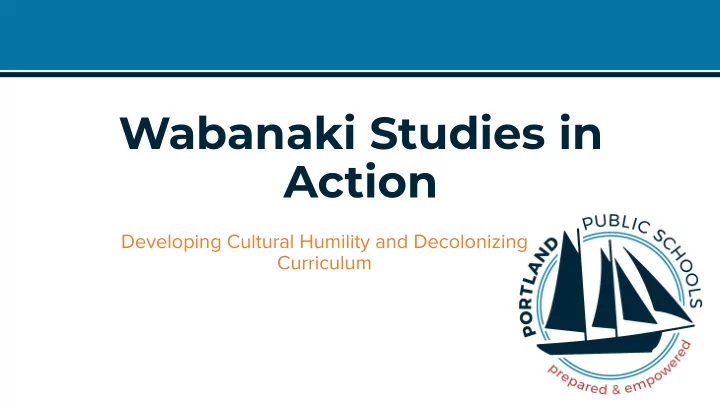

Wabanaki Studies in Action Developing Cultural Humility and Decolonizing Curriculum
Webinar Agenda for 5/14/20 ● Overview of Equity and Curriculum Work in Portland (1) ● Professional Development in Wabanaki Studies (2) ● Barriers to Compliance with LD 291 (3) ● Curriculum Planning Guide and Future Plans (4) ● Q and A with Fiona and Bridgid (5)
Equity and Achievement
Cultural Humility and Decolonization “Cultural humility is about looking deeper and discovering the complexity of our cultural inheritance . . . Regardless of whether we are on the upside or the downside of sociopolitical power, we all participate in and uphold a socially constructed hierarchy that benefits some and marginalizes others. By listening to ourselves, we can begin to recognize that participation as well as our own biases, limitations, and unconscious stereotypes.” Charlene Leung, Shambhala International
Collaboration Who are the original people of this land and what is my responsibility to them?” Dina Gilio-Whitaker, Coleville Confederated Tribes Curriculum Intensive for Portland Teachers at Penobscot Nation
Indigenous Perspectives Educators need to amplify Indigenous voices. Maria Girouard, Penobscot, Executive Director of Maine-Wabanaki REACH Veterans’ Day display at Motahkomikuk (Indian Township) School, November 2018
Truth-Telling “How do I bring dignity to a society built on colonialism and slavery? Starr Kelly, Kitigan Zibi Anishinabeg, Abbe Museum Curator of Education The Abbe Museum, Bar Harbor, Maine
Relationship Building and Learning Tribal Leaders and ● Communities ● Indigenous families ● The Abbe Museum ● USM Osher Map Library ● Maine-Wabanaki REACH ● The Upstander Project ● Friends of the Presumpscot River ● Maine Historical Society ● Teacher Summer Intensive on Sugar Island, Penobscot Chief Clarissa Sabattis, Bridgid Neptune, Fiona Hopper, and Aselis Neptune-Hood Nation
Logo designed by Native students in PPS Community Gathering for Indigenous Families in the Portland Public Schools, April 2019
Photos from Curriculum Intensive at the Penobscot Nation
“This trip will directly inform the way that I teach students about Wabanaki history and Wabanaki present. In addition, I think it has pushed me to reconsider my own colonial mindset and to do a lot more learning and unlearning of my own.” Participant in Curriculum Intensive on Sugar Island
Photos from Decolonizing Education Workshop, REACH workshop, and Passamaquoddy Ancestors’ Paddle
Barriers ● Settler Colonialism ● White Supremacy Dundee Dam, Presumpscot River, Maine
Settler Colonialism “Settler Colonialism is said to be Settler-colonization is the removal a structure not an historic event, and erasure of Indigenous peoples in whose end game is always the order to take the land for use by elimination of the Natives in order settlers in perpetuity. to acquire their land, which it Teaching Tolerance does in countless seen and unseen ways.” Dina Gilio-Whitaker, Coleville Confederated Tribes
White Supremacy “...people of color are seen A system and/or form of as inferior to white in the government founded on an ideology of the inherent making and keeping of the superiority of white Europeans nation...we are entitled to over non-whites. more privileges and Robert Jensen, The Heart of Whiteness resources because we are “better” people.” Robin DiAngelo
“We see it [truth-telling] as something very deep, a necessary transition from being an occupier, to being a neighbor.” Gkisedtanamoogk, Maine TRC
Foundational photo Work ● Common Memory ● Decolonizing curriculum Chief Polin Memorial, Westbrook, Maine
Common Memory “Where common memory is lacking, where people do not share in the same past, there can be no real community. Where community is to be formed, common memory must be created.” Georges Erasmus, Dine, Tribal Leader
Decolonization Tool 1. Existence 2. Colonization and Resistance 3. Sovereignty and Diplomacy 4. Sustainability and Endurance
Making Change ● Curriculum map ● Social Studies Vertical Team ● Ongoing Professional Dawn over Back Cove, Portland, Maine Development
Resource Highlights The Abbe Museum The Wabanaki Collection Passamaquoddy people Penobscot Culture Holding Up the Sky
Portland Teachers on the Penobscot River
Recommend
More recommend